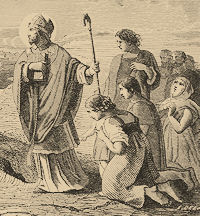“My mother and my brothers are those who hear the word of God and act on it.” (Luke 8:21)
You’re driving home one evening, using your new GPS system to navigate. Suddenly, the GPS instructs you to turn down an unfamiliar side road. You’re positive that you should stay with the road you’re already on. But you stick with the GPS and make the turn. Seconds later, you realize you’ve made a mistake that will cause you a significant delay in getting home. That’s what you get for listening to a machine!
There’s a similar issue involved in how we listen to God. When Jesus spoke of “those who hear the word of God and act on it” (Luke 8:21), he wasn’t talking about blind conformity. We are not machines programmed to obey God’s commands “according to the letter.” In fact, this kind of observance can leave us feeling hollow. We may be doing all the right things, but we’re still not happy. Jesus is talking about a new kind of obedience, one that involves our brains and hearts just as much as it involves our compliance and willpower.
This kind of obedience comes when we learn to hear God’s voice in our hearts. It’s an obedience that is flexible and personal, not a rigid adherence to every detail of the law. Think, for instance, of the time when Jesus told a woman caught in adultery that her sins were forgiven. Think, too, of the time when he healed a man on the Sabbath. In both instances, there was a technical break with the Law of Moses. But rather than stick to the letter of the law, he demonstrated a new approach, which he later called a new command: “Love one another” (John 13:34).
Today, you may run across opportunities to follow this law of love. Perhaps you’ll be eager to argue with someone about a social issue—but the Spirit will prompt you to keep quiet and just be present to them. Perhaps you’ll feel like ignoring someone whom others around you reject—but you know the right thing to do is reach out. It can be tough to follow these inspirations, but it’s worth it. For each time you listen to Jesus, you become more like him.
“Jesus, help me to listen with my heart. Teach me how to obey your law of love.”
Proverbs 21:1-6, 10-13; Psalm 119:1, 27, 30, 34-35, 44
